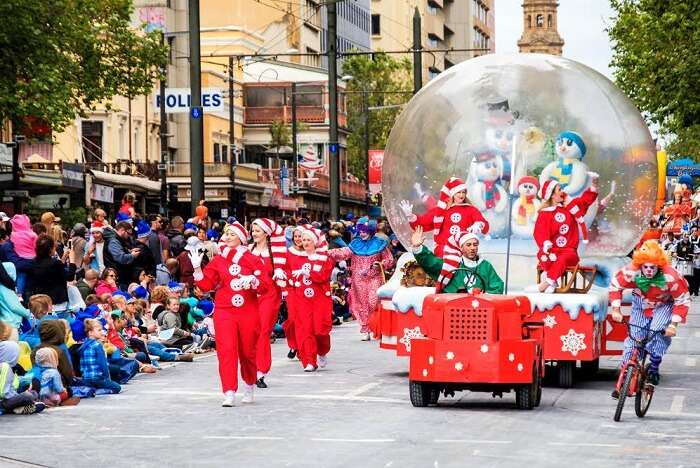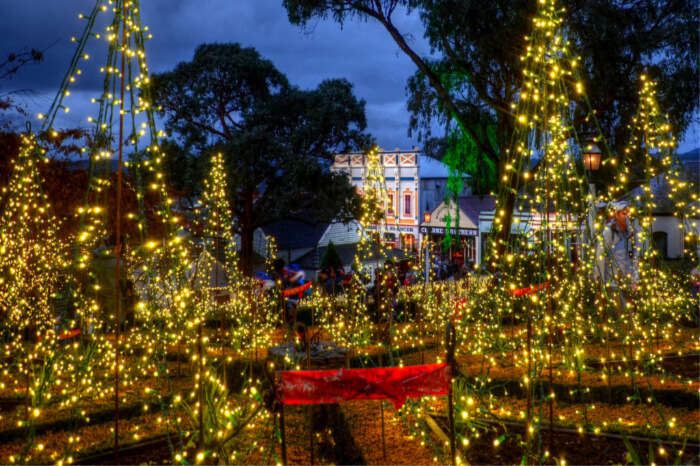Christmas in Australia is different from many Western countries, with its unique characteristics. Traveling to Australia for Christmas can be a great choice. Here’s some information and tips for your Australian travel plans:
Is It Good to Travel to Australia for Christmas?
Unlike many Northern Hemisphere countries celebrating Christmas in cold and wintry conditions, Australia experiences Christmas in the midst of summer. You’ll find brilliant sunshine, beautiful beaches, vast hinterlands, and lush rainforests everywhere. Spending Christmas in Australia is all about singing hymns in swimwear at Bondi Beach in Sydney, having beach parties, enjoying outdoor movies on the sand, and witnessing Santa Clauses surfing the waves or riding jet skis. It’s a unique Christmas experience you won’t want to miss.
One of the most unique aspects is the Christmas Day parade. You’ll see uncles in skirts and tall uncles on stilts, making you feel whimsically excited. Unlike the bulky Santas from the North, the Santas in Australia arrive on jet skis in shorts, which is amusing and novel. There are also plenty of beach barbecues to savor. This distinctive Christmas is an experience you must try if you have the chance.
Local families often choose to explore Australia during school holidays, enjoying their vacations. Therefore, this period may be relatively crowded. Plan your trip carefully, and you’ll gain insights into the peak tourist seasons for each state and territory during Christmas.
The school holiday dates for the fourth term from 2023 to 2024 are as follows in various Australian states and territories:
- Australian Capital Territory: December 16, 2023, to January 28, 2024
- New South Wales: December 20, 2023, to January 29, 2024
- Northern Territory: December 16, 2023, to January 29, 2024
- Queensland: December 9, 2023, to January 21, 2024
- South Australia: December 16, 2023, to January 28, 2024
- Tasmania: December 22, 2023, to February 6, 2024
- Victoria: December 21, 2023, to January 28, 2024
- Western Australia: December 15, 2023, to January 30, 2024
Things to Keep in Mind When Traveling to Australia:
- Time Zone: Australia is divided into three time zones: Eastern, Western, and Central. The Eastern time zone is 2 hours ahead of Beijing time in spring, autumn, and winter and 3 hours ahead in summer. New Zealand time is 4 hours ahead of Beijing time. Keep this in mind when planning your activities and flights.
- Currency: The currency in Australia is the Australian Dollar (AUD), and in New Zealand, it’s the New Zealand Dollar (NZD). The US Dollar (USD) is widely accepted. You can exchange currency at local hotels, banks, and duty-free shops.
- Clothing: Australia’s seasons are the opposite of those in the Northern Hemisphere. Their seasons are as follows: Spring (September-November), Summer (December-February), Autumn (March-May), and Winter (June-August). Australia experiences significant temperature variations, so pack accordingly. Sunscreen, sunglasses, and a hat are essential due to strong sunlight. A warm jacket is advisable for cooler evenings.
- Insurance: While travel agencies typically provide group travel insurance for Chinese citizens traveling to Australia, it’s still recommended to purchase additional travel insurance for added coverage.
- Safety: Ensure personal safety by traveling in groups and avoiding isolated areas. Always carry your hotel’s card with you, and never leave valuables unattended. Keep your passport secure, as losing it can disrupt your travel plans.
- Luggage: Check the weight and size restrictions for checked and carry-on luggage. Australia is an agricultural country, so be aware of restrictions on bringing unpermitted food and agricultural products.
- Hotel Accommodation: Hotels generally provide towels, shampoo, and soap. However, bring your toothpaste, toothbrush, and slippers. Be aware that the items in the minibar or refrigerator in your room may incur additional charges. International calls from your hotel room may also be charged, so inquire about the rates.
- Electricity: Australia and New Zealand use a 220V electrical system with three-pin plugs. Adapters are available for loan at hotels, but it’s advisable to bring your own if you need to charge multiple devices.
- Nighttime Activities: When going out at night, avoid remote areas, and travel in groups when possible. Request a business card from your hotel and carry it with you in case you need assistance returning to your accommodation.
- Double-check: Before leaving your hotel each day, double-check your belongings to ensure nothing is left behind to avoid any disruptions to your travel plans.
- Transportation Safety: While traveling in Australia and New Zealand, remember that vehicles drive on the left side of the road. Stay seated when the vehicle is in motion, and don’t open windows or extend your head outside while on highways.
Traveling to Australia for Christmas can be an exciting and unique experience. Just be prepared for the different climate, customs, and safety considerations specific to the region. Enjoy your trip!



